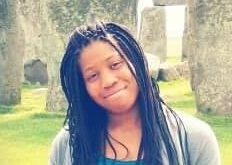miCRo: “Florida” by Heather Sellers
In the magical world Sellers describes, we are reminded of the transitory and beautiful nature of being.
miCRo: “White Hot Star” by W. Todd Kaneko
W. Todd Kaneko’s “White Hot Star” paints a richly layered portrait of masculine inheritance.
miCRo: “Have You Eaten Rice” by Jin Su Joo
In Jin Su Joo’s “Have You Eaten Rice” we learn about several key relationships in the speaker’s life through the lens of rice.
miCRO: “Across the Street” by Allison Field Bell
Allison Field Bell’s “Across the Street” unfolds like the recounting of a distant memory. Through a mosaic of fractured images, we understand pieces of the setting and pieces of the violence that was done there…
miCRO: “River Body, Body Woman” by Jeneé Skinner
In this moment of collective grief, I’ve been thinking about how any individual griefs are heightened by the circumstances.
miCRo: “Pepe’s Curse” by Jessica Franken
In “Pepe’s Curse,” Jessica Franken captures the complex reality of being a woman in public.
miCRo: “The Neighborhood Girls Sabotage the Dairy Queen Order” by Allison Pitinii Davis
The formal cleverness of Allison Pitinii Davis’s “The Neighborhood Girls Sabotage the Dairy Queen Order” is hard to overstate. Davis teaches us to read the poem as it goes…
miCRO: “Favoring the Nightcap” by Chase Burke
The quiet but deeply uncomfortable tension that permeates Chase Burke’s “Favoring the Nightcap” will be recognizable to anyone who has ever suffered under the hard hand of generational trauma.
miCRo: “Detonations” by 신 선 영 Sun Yung Shin
“Modernity is a rust factory,” Sun Yung Shin declares in “Detonations,” a poem in which the technology of war brutally contrasts a natural landscape.
miCRo: “Waiting My Turn” by Jaswinder Bolina
“As someone who’s become obsessed with space flight lately, I admire how Jaswinder Bolina imagines its future and our future, one in which we—a much more inclusive we—regularly jet to other planets.”
miCRO: “외계인 | Waygyein” by Kat Lewis
Kat Lewis’s “외계인 | Waygyein” is a heartbreaking meditation on the otherness inherent in being a stranger in a strange land.
miCRo: “Assistant Guide” by Mary Ardery
Mary Ardery’s flash autofiction piece “Assistant Guide” gives the reader a glimpse into the addiction recovery community, where the specter of relapse, and its attendant violence, looms large.


















